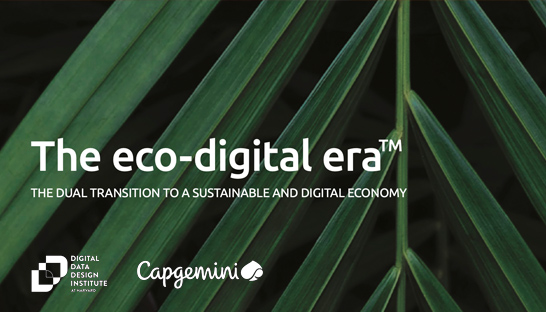
The eco-digital economy is poised for tremendous growth in the coming years. By 2028, the market is set to reach nearly $33 trillion, nearly doubling from last year, according to a new study by Capgemini.
The combination of ecology and digitization is rapidly gaining ground in the business world. In response to the ongoing climate crisis, companies have widely adopted digitization as part of a a strategy to promote sustainability.
So far, that seems to have been paying off. Thanks to digital technologies, companies worldwide have reduced their energy consumption by 24% and their CO2 emissions by 21% since 2018, according to Capgemini’s research report.
In the coming years, digital solutions will play an increasingly important role in both sustainability and economic growth, said Fernando Alvarez, Chief Strategy and Development Officer at Capgemini.
“We are transitioning to an eco-digital economy. It’s not just about economic value but also about ecological and social value,” said Alvarez.
Think of this eco-digital economy not only in terms of digital tools that companies use for their own sustainability efforts but also technologies that create positive societal impact beyond the organization, such as electric cars.
Capgemini foresees a significant growth spurt for the global eco-digital economy. Last year, it was valued at $16.6 trillion, and by 2028, it is expected to reach approximately $32.9 trillion. This means the global eco-digital economy will double in just five years.
But that is not the end of it, emphasizes Alvarez: “We’ve only scratched the surface of how digital technologies can help achieve significant economic, ecological, and societal benefits.”
But what about the energy consumption of all these digital technologies themselves? For example, data centers consume a lot of power. Despite that significant power consumption, Capgemini’s research shows that from 2028 onwards, widespread adoption of digital technologies will actually lead to a net reduction in global greenhouse gas emissions.
Increasing share
The researchers also expect the eco-digital economy to become significantly larger relative to the total global economy. It currently represents only 15.8%, but over the next five years, this percentage could rise to around 26.2%.
They anticipate that the share in Europe will almost double, from 15.5% currently to 29.4% in 2028. For Asia, they expect growth from 22.4% to 32.1%, and for North America, from 16.5% to 29.7%.
Europe
According to Capgemini, countries like the Germany, Netherlands, Denmark, Sweden, and Finland are among the “most advanced digital economies” in the EU. Currently, France accounts for 3.9% of the global eco-digital economy and Germany is just behind it with 3.6%.
The largest slice of the pie globally belongs to the United States. The global powerhouse accounts for over a quarter (25.8%) of the global eco-digital economy. The country following closest behind the US is Japan at 11.1%, followed by mostly European countries and Canada with 2.1%.
For its research, Capgemini surveyed more than 1,500 diverse organizations from 14 countries (including several EU countries) with a minimum revenue of $1 billion or an annual budget of over $50 million for activities in the public sector. Additionally, the researchers conducted a desktop study.






